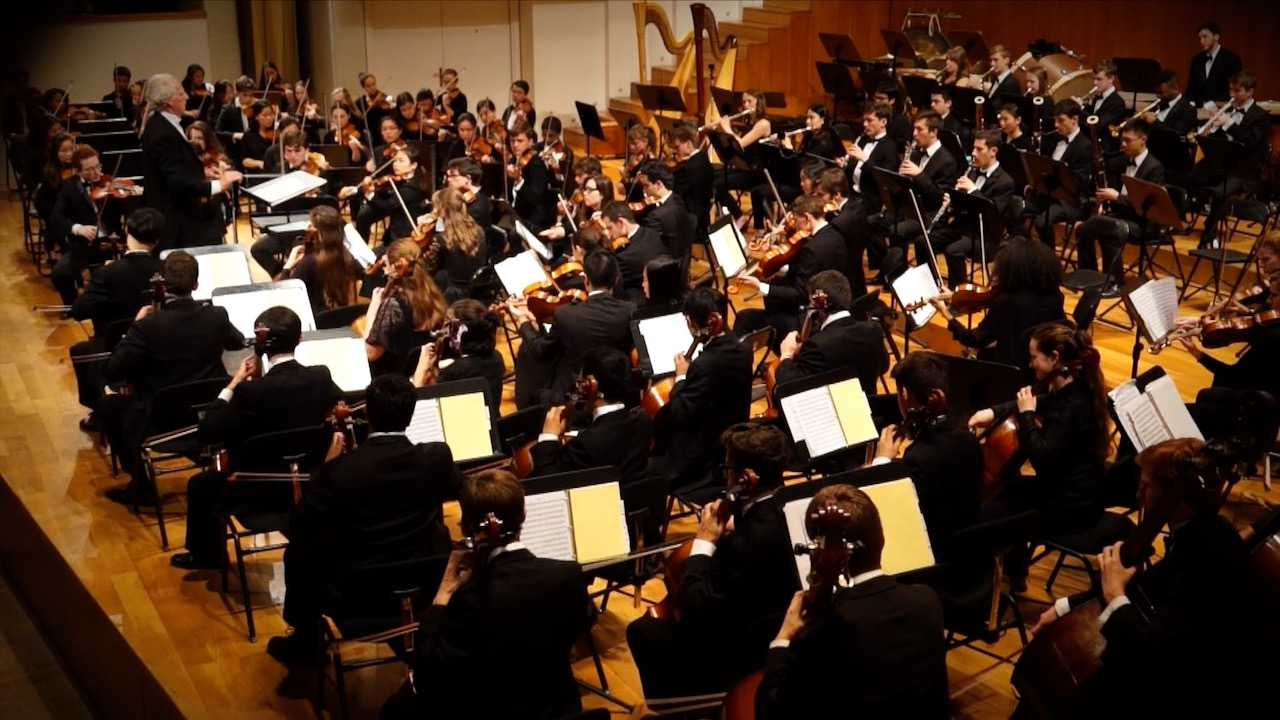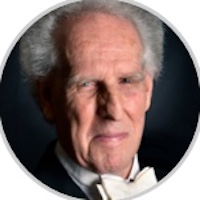What's Next? Future of the BPYO in the Covid-19 Pandemic

Dear BPYO,
Since our last concert in Symphony Hall on March 12th, we have been trying to find a way for BPYO to continue to function in the Covid-19 era.
Over the summer we experimented with many options that would enable us to both stay within the state guidelines and let us play great music together. But as time passed, it has become clear that—ingenious and exciting though they seemed—these plans were impractical, given the restrictions imposed to keep everybody safe.
Dr. Leslie Fang, from Harvard and Mass General, known as “The Pope of Covid” has agreed to guide us through this challenging period and provide up-to-date advice, given our circumstances. Dr. Fang has said that, barring extraordinary and unforeseen developments, there will likely be no live music performed by large orchestras in enclosed spaces in Boston till next summer. At first, I had to admit defeat in the face of this shocking news. But gradually alternatives began to develop.
What is called for is a paradigm-shift in leadership.
Here is my proposal:
The BPYO will begin this year without expectations of rehearsing together, playing any concerts or going on tour. Instead, you will be invited to go on a personal and collective journey, as if you were taking on the role of a conductor. This idea is inspired by our mission: Shaping Future Leaders through Music. Each member, irrespective of age or level of experience will be given the opportunity to explore the musical, psychological, emotional, physical and spiritual challenges that face a conductor. This doesn’t mean that you would have to show any interest in becoming actual conductors, but that you would be open to a shift in attention away from your individual instrument to the whole “Symphonia.” It is intended to help you to grow as musicians; to open your ears; and to help you understand how your part fits into the larger context. It is a journey into the unknown at a time when the world is living each day in the unknown and it will require transformational thinking at every turn.
Here is an example:
Since there will be no “seating” in BPYO – you will all be sitting at home in the first chair! – shouldn’t we cancel the seating auditions? After much thought my decision is not to cancel the auditions. Here’s why:
You have all been asked to prepare a fast piece to demonstrate your virtuosity and a slow piece that shows how you shape a phrase, how you coax a gorgeous sound from your instrument, and how well you communicate your love of music. It seems to me that after a long frustrating summer, concentrating on these matters can help focus your musical energies.
You have also been asked to prepare excerpts from the orchestral repertoire. I have to admit that I have long questioned the value of this exercise, but in the light of our new paradigm, where every member of the orchestra is “thinking like a conductor,” I see an opportunity. Under normal circumstances you might have little interest in the excerpts of any instrument other than your own. But suddenly these famous musical moments, which are worked on by every instrumentalist with professional ambitions, would become the common concern of everyone in the orchestra, just as they are to every conductor.
To that end, I am preparing a detailed study sheet for each excerpt, and am presenting them in such a way that they would likely be of interest to our new hoard of “conductors.”
By providing some background, stories, discussion of tempo, anecdotes, as well as recordings of different performances with each excerpt, I hope to ensure that everyone in the orchestra will learn more about the instrument in question and the works that are discussed, as well as about some of the major players in the music world.
Later on, in our Saturday sessions, when a member of the orchestra is asked to demonstrate an excerpt, I would know that every one of you, listening on Zoom, would be aware of each detail, every challenge that conductors face, and would be prepared to jump in and offer coaching and advice—just as conductors do.
Please go ahead, all of you, and read the commentary for the flute and oboe excerpts, which are attached. Listen to the musical examples, think about it, argue with friends, try out different ideas, think about what you learned about the two instruments that you didn’t know and what might apply to your instrument. And in the case of the Brahms 4th excerpt, watch the four minutes of film featuring the superb Ukrainian ballet dancer, Sergei Polunin performing Take me to Church and wonder why it is included in a discussion of a flute excerpt!
If the idea of doing that excites you, you are probably the right person for this journey that I am proposing.
When Sir Ernest Shackleton was looking for a team of men to join him on his expedition to make the first crossing of the Antarctic, he posted an advertisement which was designed to discourage anyone not up to the challenge from applying.
“Men wanted for hazardous journey. Small wages. Bitter cold. Long months of complete darkness. Constant danger. Safe return doubtful. Honour and recognition (only) in case of success.”
Pulling no punches, the ad was an all-out challenge to commit. (You can read the whole extraordinary story in Roz Zander’s book Pathways to Possibility.)*
It begins with these words: Consider the following story of Sir Ernest Shackleton, who went on a literal exploration that turned into a test of the power of the mind to defy the odds of accepted reality.
We are at such a moment. The temptation to hide, go into despair, escape or give up is enormous. I confess, as any honest person must, that I have been tempted by all those four and others.
My decision to face Dr. Fang’s informed prognosis, based on the best available science, was one of the hardest I have made. The decision to launch this journey with you all, rather than simply closing the institution down for a year, was one I embraced with enthusiasm.
The challenge of the new world in which we find ourselves is calling on resources of courage, ingenuity and, above all, optimism that we have never expected to demonstrate. But meeting this challenge would be part of the training that this journey is going to offer to all of us. It is going to require a commitment to engage and persevere way beyond simply showing up. So, far from discouraging you from joining this venture, which is so different from what you originally signed up for, I am asking you to think about whether you are willing to participate “on the court,” rather than sitting in the bleachers observing the action below.
If you are game to join, I want you to go “All IN.” For it to succeed, this project—an orchestra of “conductors”—will need full engagement, cooperation, enthusiasm, good listening, curiosity, energy, and open-heartedness, which are all essential characteristics for a conductor.
The BPYO audition is traditionally in two parts: 6 minutes of playing and 6 minutes of conversation. I am proposing that during those 6 minutes of talking you give me some idea of what draws you to this journey, so that I can discover who might be “in the boat” with me, and you can tell me your own discoveries about the potential of the experience.
It will give me an invaluable opportunity to get to know you if you are new to BPYO, and to get to know you better if you have already been a member. We can also share how you are dealing with the Covid situation: What do you hope will come out of this difficult moment?
The sessions will take place during the regular Saturday afternoon period and will be divided between explorations of the language and grammar of music; conducting; interpretation; leadership and life skills; preparing orchestral excerpts; study of symphonic scores, poetry and other glories.
We will try to find as many opportunities for live music-making as the situation permits and I will bring in guests to talk to you and coach. I already have promises from Nicky Schwartz of the Concertgebouw to do a double bass class; Carol Wincenc to work on wind playing; Bruce Coppock will talk to you about career building, as well as the extraordinary flowering of forward-thinking music-making in Europe. There will be many others.
If you are not attracted by the idea of participating in this venture, you may opt out. And if things change in the coming months and the opportunity to make music as an orchestra is restored, you would, of course, be welcome to rejoin.
If you had decided, or were forced by circumstances beyond your control, to drop out of BPYO for this year, this plan would enable you to rejoin virtually.
This is an experiment. It depends for its success on the kind of partnership and interaction usually found only in self-directed chamber ensembles. A sense of humor is essential and so is optimism. I will depend on your forbearance, experience, ingenuity and expertise with technology, since my own experience with Zoom is so limited. However, I know that the energy will flow back to me from you and help to make it work. I am interested in creating something that can teach us all something new. It would certainly be easier for me to take the year off and act my age. However, I do not usually walk away from extraordinary opportunities, or extraordinary people. So, I look forward to an amazing journey.
Here are assignments for the Flute and Oboe.
I have just added another excerpt: Beethoven 5th, 2nd movement. The opening of the second movement of Beethoven’s 5th is one of the cello and viola excerpts.
Here is a detailed practice sheet for it.
I am not expecting the cellists and violists to absorb all the details in such a short time before the auditions, but since it will be a passage that we will look at in one of our earliest Saturday Zoom classes I thought it would give everybody a chance to get a head start with one of the most beautiful and well-known themes in the entire musical repertoire.
For those who are preparing Don Juan, there is a video by the leader of the New York Philharmonic on this most ubiquitous of excerpts. It’s a good example of intelligent practice, so it would be good for everyone to watch it through.
I hope you enjoy working through the excerpts as much as I have enjoyed creating them. Remember you are about to “conduct” these pieces. Get prepared!
Please watch your email for another message about how to confirm your participation and schedule the interview. I look forward to hearing your videos when I get back from my little vacation on Martha’s Vineyard. I am excited to get to know all the new people whom I have met only on their video auditions.
Warmest best wishes for a creative year for all of us,
Ben Zander
*The story of the Shackleton Expedition from Pathways to Possibility by Rosamund Zander (Penguin 2016): Optimism is the True Moral Courage.
View all the Rehearsal Recaps in the BPYO during COVID Collection.
 Benjamin Zander
Benjamin Zander